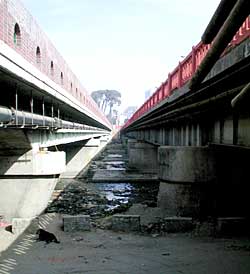Nowhere is that more true than the way we have been dealing with our nation's development for the past 40 years. Sorry to keep on harping about it on this page, but we have really messed things up big time. Despite being the darling of the donors, despite commanding tremendous international goodwill, and despite having enormous potential to surge ahead with tourism and hydropower, we have failed in the only criteria that really matters-we have failed to raise living standards and ensure equity among Nepalis. These failures are all the more glaring because the success stories abound (see "Not all gloom and doom" in # 75). In all these cases, we see how easy it is to achieve results with a simple combination of integrity, commitment and good management.
Blaming a heartless elite, finding scapegoats, bashing donors, is all very well and easy to do. Many of them deserve it. But that is not going to get us out of the rut we're in. This time we have to look forward, chart out a strategy, give ourselves realistic targets and work hard to achieve them. Nepali officialdom needs to show a singlemindedness we have not seen in the past. Our elected leaders need to demonstrate vision, honesty and efficiency. Nepal's problems are vast, and solutions are urgently needed. Before we start sounding like a minister's speech, here is one of our periodic checklists for urgently-required interventions:
1. Resolve the Maoist crisis one way or the other, to
2. Go hand-in-hand with a massive job-creation initiative, by
3. Wooing domestic and foreign investors, and
4. Concentrating on high-value, long-staying tourism.
5. Launch a nationwide infrastructure drive that will create jobs and provide a backbone for future development,
6. Concentrating in the midwest and other neglected areas.
7. Launch an effective anti-corruption drive to catch the big fish, and start with the most blatant and easy-to-stop graft: fuel adulteration.
8. Rescue the garment, pashmina and carpet industries with export promotion, price stabilisation and quality control.
9. Begin a result-oriented delivery of basic health and primary health care to rural areas.
10. Show us some proof that we have a government.
We got a tiny glimpse of the kind of effort required during the past weeks of breakneck park-building, road-paving and zebra-painting in Kathmandu. We had invited SAARC dignitaries for a party, and we were ashamed about what they would think when they saw the slums at Tinkune, the shabby buildings and dusty roads. So we spruced them up. Somehow it doesn't seem to matter that the asphalt is already frayed, the zebras have faded, the sidewalks have crumbled. But at least it looked good for a while. We showed that when push comes to shove, we can get off our behinds. And with slightly more honesty and efficiency, we could get much better results.
 If only we showed the same sense of shame about outsiders finding out about our female literacy, which is the lowest in South Asia. If we could be as embarrassed by our maternal mortality rate, which is one of the highest in the world. If we hung our heads in shame at the proportion of Nepali children who are stunted because of poor nutrition. That is what we should be ashamed about, not what visitors will think about the shanty town below Bagmati Bridge.
If only we showed the same sense of shame about outsiders finding out about our female literacy, which is the lowest in South Asia. If we could be as embarrassed by our maternal mortality rate, which is one of the highest in the world. If we hung our heads in shame at the proportion of Nepali children who are stunted because of poor nutrition. That is what we should be ashamed about, not what visitors will think about the shanty town below Bagmati Bridge. The party is over, and there have been enough speeches. Let's get to work.


